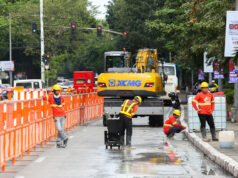
THE Philippine Economic Zone Authority (PEZA) declared its opposition to measures in the House of Representatives proposing new economic zone and freeport authorities.
The investment promotion agency (IPA) submitted Wednesday a position paper to the House’s Committee on Ways and Means.
“There is no need to legislate another or more ecozone and freeport authorities. It is unnecessary for this will just burden our bureaucracy, add cost to government operations, and create internal competition (among) ecozone authorities… instead of having a united IPA,” PEZA Director-General Charito B. Plaza said in a statement Thursday.
She said PEZA supports the creation of more economic zones regulated by PEZA.
An act creating a Mega Cebu Development Authority has been pending with the House Committee on Local Government since Feb. 24.
The bill to create the Eastern Visayas Development Authority was approved by the House Committee on Government Enterprises and Privatization on Feb. 19, while several more are pending, including the Visayas Development Authority, the Taal Lake Development Authority, and the Metro Cagayan de Misamis Development Authority.
The establishment of a special defense economic zone in Bataan and special economic zones in Occidental Mindoro, Oriental Mindoro, Cagayan de Oro, Cavite, Surigao del Sur, Camarines Sur, Ilocos Norte, Ilocos Sur, Cebu, Palawan, Bohol, and others are also pending in the House.
The National Economic and Development Authority also declared its opposition, saying that additional bodies would create overlapping roles, leading to inefficiencies. NEDA director-general Ernesto M. Pernia said the authority supports private sector-led initiatives instead of publicly-owned ecozones and freeports.
PEZA said it believes the government should not compete with the private sector, noting government challenges in budgeting and procurement.
“The law creating PEZA gave it the mandate to establish special economic zones which are suitable to the land in the area and to strategic locations in the country. The creation of ecozones do not need to be from government coffers, but through options like joint venture, or Public Private Partnership (PPP) either with foreign or domestic entities,” Ms. Plaza said.
The Special Economic Zone Act of 1995 gave PEZA the authority as the principal government agency to operate and develop export-oriented economic zones.
PEZA said that it is pushing for private sector-led development and focuses on its role as a regulatory agency and “enabler of business” to increase the number of ecozones. The authority added that the house bills proposing new ecozone authorities propose P2 billion from national government.
“In sum, the new ecozone/freeport authorities will just be replicating what PEZA is doing in the entire country. And worse, funding the development of these proposed new ecozones and free ports will require allocation of huge capital outlays from the government,” Ms. Plaza said. — Jenina P. Ibañez



